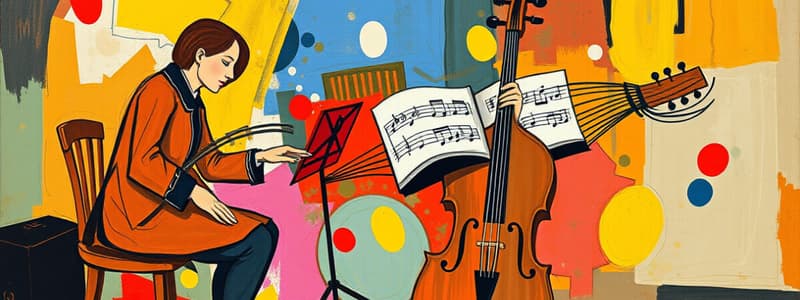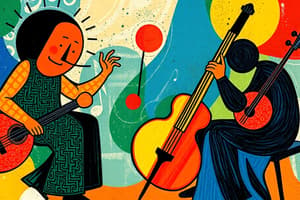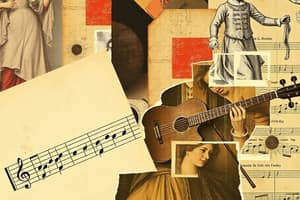Podcast
Questions and Answers
What years define the Baroque Period?
What years define the Baroque Period?
1600-1750
Which of the following are characteristics of Baroque music? (Select all that apply)
Which of the following are characteristics of Baroque music? (Select all that apply)
- Opening melody heard repeatedly (correct)
- Rigid rhythmic patterns
- Gradual changes in volume
- Mood throughout (correct)
Which of the following are major Baroque composers? (Select all that apply)
Which of the following are major Baroque composers? (Select all that apply)
- Johann Sebastian Bach (correct)
- Ludwig van Beethoven
- George Frideric Handel (correct)
- Wolfgang Amadeus Mozart
Basso continuo is played by a ______ instrument following numbers which specify the chords.
Basso continuo is played by a ______ instrument following numbers which specify the chords.
What does the patronage system mean for musicians?
What does the patronage system mean for musicians?
Where did most people hear music during the Baroque period?
Where did most people hear music during the Baroque period?
Which of the following are Baroque musical genres? (Select all that apply)
Which of the following are Baroque musical genres? (Select all that apply)
What is a concerto grosso?
What is a concerto grosso?
What is an opera?
What is an opera?
What is a libretto?
What is a libretto?
What are the two primary types of solo songs in opera? (Select all that apply)
What are the two primary types of solo songs in opera? (Select all that apply)
What was the first known opera?
What was the first known opera?
Who were the Castro Singers?
Who were the Castro Singers?
Match the composer with their notable contributions or characteristics:
Match the composer with their notable contributions or characteristics:
What years define the Classical Period?
What years define the Classical Period?
Which of the following are characteristics of music from the Classical period? (Select all that apply)
Which of the following are characteristics of music from the Classical period? (Select all that apply)
Who are major composers of the Classical era? (Select all that apply)
Who are major composers of the Classical era? (Select all that apply)
How did the role of the middle class affect music performance opportunities?
How did the role of the middle class affect music performance opportunities?
What was the Enlightenment?
What was the Enlightenment?
Which of the following are Classical music genres? (Select all that apply)
Which of the following are Classical music genres? (Select all that apply)
What is the structure of a concerto?
What is the structure of a concerto?
What is a symphony?
What is a symphony?
What defines a rondo?
What defines a rondo?
Which of the following composer wrote string quartets? (Select all that apply)
Which of the following composer wrote string quartets? (Select all that apply)
What is chamber music?
What is chamber music?
What is significant about Mozart's Requiem?
What is significant about Mozart's Requiem?
How many operas did Mozart write?
How many operas did Mozart write?
How did Beethoven's deafness affect his music?
How did Beethoven's deafness affect his music?
How many string quartets did Beethoven compose?
How many string quartets did Beethoven compose?
What made Beethoven an innovator in music?
What made Beethoven an innovator in music?
How many symphonies did Beethoven compose?
How many symphonies did Beethoven compose?
Flashcards are hidden until you start studying
Study Notes
Baroque Period Overview
- Timeframe: 1600-1750
- Significant contribution to the development of Western classical music.
Characteristics of Baroque Music
- Unified mood maintained throughout pieces.
- Rhythmic patterns are prominent; opening melodies are recurrent.
- Continuous expansion of melodic sequences.
- Dynamics showcase constant volumes with abrupt changes known as terraced dynamics.
Major Composers of the Baroque Era
- Johann Sebastian Bach: His death in 1750 marks the end of the Baroque period.
- George Frideric Handel: Another key figure influencing the era.
Basso Continuo
- An essential accompaniment played by keyboards, following numeric chord indications.
- Comparable to modern jazz and pop “fake book” notation.
Patronage System for Musicians
- Court musicians enjoyed affluence and skilled roles, often as Music Directors.
- Church musicians were typically trained through apprenticeships, especially in orphanages.
Baroque Audiences
- Majority experienced music primarily in church settings.
- Public opera performances were less common and accessible to fewer audiences.
Baroque Musical Genres
- Prominent genres included concerto grosso, opera, oratorio, and fugue.
Concerto Grosso
- Features a small group of soloists contrasted with the orchestra.
- Structured in multi-movement form: fast, slow, and fast, with a ritornello section framing the first and last movements.
Opera Overview
- A dramatic art form combining singing with orchestral accompaniment.
- Can be serious, comedic, or incorporate elements of both.
Libretto
- The written text of an opera, serving as the foundation for the music.
Types of Solo Songs in Opera
- Recitative: Advances the plot.
- Aria: Conveys emotion and character feelings.
Notable Early Operas
- First known opera: Euridice.
- First large-scale opera: Orfeo by Monteverdi.
Castrato Singers
- Male singers castrated before puberty to preserve their soprano or alto vocal range.
Elements of Opera Production
- Chorus: Group of singers supporting the narrative.
- Prompter: Provides cues to performers during a performance.
- Prelude or overture: Instrumental introduction to the opera acts.
Key Baroque Composers
- Claudio Monteverdi: Prominent for the first significant opera, Orfeo; 30 years at St. Mark's in Venice.
- Henry Purcell: Influential English composer, known for his court position and interment under Westminster Abbey's organ.
- Antonio Vivaldi: Late Baroque figure called "The Red Priest," known for teaching orphaned girls music and for his virtuosic violin compositions.
- Handel: A contemporary of Bach, he became England’s most important composer of operas.
Oratorio
- Similar to opera but performed without acting or stagecraft, focusing on biblical narratives.
Fugues
- Essential form in Baroque music, involving multiple voices taking turns presenting melodies, either vocal or instrumental.
Johann Sebastian Bach's Organ Music
- Known for his mastery of both sacred and secular music, he wrote works in every musical form except opera and is celebrated for his polyphonic and harmonic techniques.
Classical Period Overview
- Timeframe: 1750-1820.
- Marks a shift in musical style and form from the Baroque.
Characteristics of Classical Music
- Emphasizes contrast within movements and diverse rhythmic patterns.
- Predominantly homophonic textures, with melodies that are memorable.
- Features gradual dynamic changes versus the abrupt shifts of the Baroque.
Major Composers of the Classical Era
- Joseph Haydn: Worked for an aristocratic family for over 30 years.
- Wolfgang Amadeus Mozart: Started at court, later became a successful freelance composer.
- Ludwig van Beethoven: Renowned for being an independent musician.
Role of the Middle Class
- The growing middle class sought concert experiences akin to those enjoyed by the aristocracy.
Classical Music Genres
- Includes theme and variation, concerto, symphony, opera, rondo, string quartet, and chamber music.
Theme and Variation in Classical Music
- Structured as a single part form where a basic idea is presented and varied continuously without large contrasting sections.
Concerto and Cadenza
- Concerto features a soloist with orchestral backing in a 20 to 45-minute form, typically structured in three movements.
- Cadenza: a unique improvisational break near the end of the first and last movements.
Symphony Structure
- Compositions last 20 to 45 minutes typically consist of four movements:
- First: Fast, often in sonata form.
- Second: Slow, could be sonata or theme and variations.
- Third: Dance-like, commonly in minuet and trio or scherzo form.
- Fourth: Fast, frequently in sonata or rondo form.
Rondo Structure
- Characterized by a tuneful main theme that recurs, with two forms:
- Small: A B A C A.
- Large: A B A C A B A.
String Quartet
- Ensemble consisting of two violins, viola, and cello, typically following a four-movement format.
Notable String Quartet Composers
- Beethoven: Composed 16 string quartets.
- Haydn: Credited as the "Father of the String Quartet" with 68 quartets.
- Mozart: Authored 27 string quartets.
Chamber Music
- Designed for small group performances in intimate settings, usually featuring 4 to 9 musicians.
Mozart's Requiem
- His final composition, posthumously completed by one of his students.
Mozart's Operas
- Composed a total of 22 operas.
Beethoven's Deafness
- His condition led to suicidal ideation but compelled him to continue creating music, composing significant works during total deafness.
Beethoven's Contributions to String Quartets
- Authored 16 string quartets, marking a significant contribution to the genre.
Beethoven as a Musical Innovator
- Achieved financial success as an independent musician, contributing to the evolution of musical forms.
Beethoven's Symphonies
- Composed a total of 9 symphonies, notable for their extended development time and unique qualities.
Studying That Suits You
Use AI to generate personalized quizzes and flashcards to suit your learning preferences.




